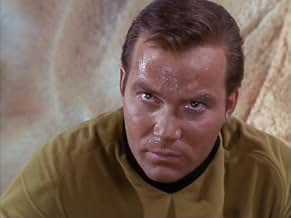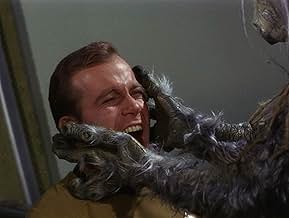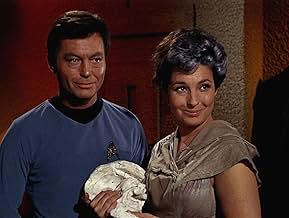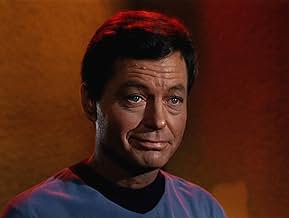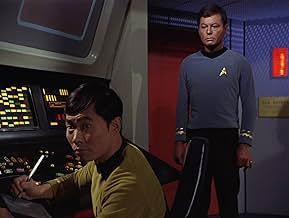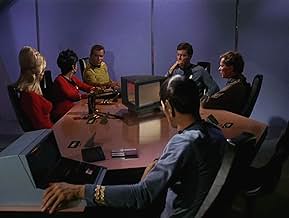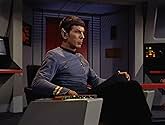The Man Trap
- El episodio se emitió el 7 ene 1969
- TV-PG
- 50min
Añade un argumento en tu idiomaDr. McCoy discovers his old flame is not what she seems after crew members begin dying from a sudden lack of salt in their bodies.Dr. McCoy discovers his old flame is not what she seems after crew members begin dying from a sudden lack of salt in their bodies.Dr. McCoy discovers his old flame is not what she seems after crew members begin dying from a sudden lack of salt in their bodies.
- Dirección
- Guión
- Reparto principal
- Barnhart
- (sin acreditar)
- Crewman
- (sin acreditar)
- Crewman Sturgeon
- (sin acreditar)
- Beauregard
- (sin acreditar)
- Lieutenant Hadley
- (sin acreditar)
- Brent
- (sin acreditar)
Reseñas destacadas
Off to a great start with the first season, first episode of ST-TOS. It is taken very much seriously - nothing cutesy or funny about it. Like all Star Trek TOS - you'll either like the Captain and Crew or you simply won't.
Oddly, this episode looks and feels like a later episode... one that you know the characters better rather than the very first episode aired for TV audiences in 1966.
7/10
This kind of story is what you'd expect in a series late in its run when it's run out of ideas. In TOS terms, you'd expect this from season three.
But this one works well because it's very well produced and the character interplay is great, even when the character is the shapeshifter.
Professor Crater makes a surprisingly convincing and compelling "villain".
I understand why some fans don't much care for this episode. Though not intended as such, it resembles the "monster of the week" sort of story ABC insisted on for "The Outer Limits". As for the creature's failure to ask Kirk for a metric ton or two of salt -- Ryder urgently requested salt, but Kirk failed to provide it.
I like it for a number of reasons, principally that it's cool and low-key (in contrast to the noisier theatrics of almost every episode that followed). The photography is grand, making effective use of pools of light against darker backgrounds. (This would soon disappear.) There's almost no music, with sound effects creating an eerie atmosphere. From a strictly "aesthetic" perspective, "The Man Trap" is arguably the best of all the Classic episodes.
It is a compelling story about the crew encountering a life-form on the verge of extinction. They are put in a difficult position of having to defend themselves but in the same breath face the prospect of possibly doing something that equates to genocide. This is handled in a plausible way and with some acknowledgement and reflection placed upon the actions taken.
One of its major strengths is that it properly establishes characters in the way an early episode should. A lot of focus is placed on Kirk's command decisions and we learn about him in these moments. Interestingly, he is portrayed slightly more aggressive in nature than usual, particularly towards Bones, who for the majority of the episode, as Kirk bluntly states, thinks with his glands. The banter between the two is enjoyable from start to finish. Spock has some character defining moments in his interaction with U'Hura and also in a more confrontational scene involving Kirk and Bones towards the end.
This is quite a unique episode in several ways. It focuses on some small character moments that never get the same attention later on in the show. Refreshingly, there is none of the dramatic music that made later episodes louder and feel more dated. Also, Kirk's narration is spoken in past tense, which doesn't make a great deal of difference but does unnecessarily explain the situation a bit too much at the beginning.
When the high drama comes during the episode's conclusion, that's when I feel the age of it. We have over-the-top physical acting, the splendour of a dodgy creature costume and I felt an overall sense of unintentional humour. However, this for me is part of the charm of the original series. It was television made during the 1960s and you have to take the positives out of these moments.
Starting, like any other episode, with the "Captain's log, star date whatever" narration by Captain James Kirk (William Shatner), The Man Trap takes place on a deserted planet where a scientist (Alfred Ryder) and his wife (Jeanne Bal) are studying the remains of an ancient society. The starship USS Enterprise is orbiting around the planet so that Kirk can give the two new food supplies and the ship's physician, Dr. Leonard "Bones" McCoy (DeForest Kelley), can check on their medical condition. This proves to be a bit awkward, since he and the woman were romantically involved once. Greater problems lie ahead, though, as Enterprise crew members are found dead. The cause is salt deprivation, and the strange marks on their necks suggest someone or something is doing this deliberately. Now it's up to Kirk, McCoy and Mr. Spock (Leonard Nimoy), the Enterprise's half-human, half-Vulcanian scientist, to find out what's going on and how to stop it.
As is the case with most Star Trek episodes, the plot is quite simple: new planet, weird event, people in danger, Kirk and his pals saving the day. It's essentially the blueprint for the monster-of-the-week stories of The X-Files, not to mention the reason NBC agreed to give the show a chance (the original pilot, The Cage, was rejected because it was considered "too cerebral"). The apparent simplicity is used as a tool to conceal deeper issues in later installments, but here it's exactly what it looks like: a very basic script that allows any viewer to access the classic Star Trek universe without worrying about any complicated, underlying "mythology" (an element that has been mandatory in successful genre shows made after 1990). In that sense, the first Trek series is the science-fiction equivalent of Seinfeld: watch a random episode, and you'll enjoy it just as much as if you were viewing them in the correct order (the feature films changed that a little, but it's another story).
But if the stories are that simple, why bother? The answer is equally basic, but not less relevant for that: the leading trio of Kirk, Spock and McCoy (even though they weren't acknowledged in that way until the start of Season 2: up to that point, only Shatner and Nimoy are credited in the title sequence; everyone else is listed in the closing credits). The elementary combination of a curious, optimistic leader, a less cheerful doctor and a purely rational, (mostly) emotionless half-alien is the kind of narrative decision that, if played well, can make the fortune of any good story. Granted, this episode doesn't contain many of the typical elements (especially the more alien traits of Spock's personality), but the seeds of all the great things to come (the chess games, the arguments, the incessant exchanges of dry wit between Bones and Spock) are clearly visible here.
In short, this may not be the proper first episode of the series, but given the standalone nature of the original Trek scripts, it works pretty well as an introduction to Gene Roddenberry's seminal TV universe, a place "where no man had gone before". It's the beginning of a small-screen legend, therefore a must-see.
¿Sabías que...?
- CuriosidadesAlthough this was the first episode to air on NBC, it was actually the sixth episode produced. NBC chose to air this episode first because they felt that it had more action than any of the first 5 episodes and it also featured a monster.
- PifiasProfessor Crater identifies human incisor teeth as having once been fangs. This is incorrect. The canine teeth were originally fangs.
- Citas
Mr. Spock: Miss Uhura, your last sub-space log contained an error in the frequencies column.
Uhura: Mr. Spock, sometimes I think if I hear that word 'frequency' once more, I'll cry.
Mr. Spock: Cry?
Uhura: I was just trying to start a conversation.
Mr. Spock: Well, since it is illogical for a communications officer to resent the word 'frequency'... I have no answer.
Uhura: No, you have an answer. I'm an illogical woman, who's beginning to feel too much a part of that communications console. Why don't you tell me I'm an attractive young lady, or ask me if I've ever been in love? Tell me how your planet Vulcan looks on a lazy evening when the moon is full.
Mr. Spock: Vulcan has no moon, Miss Uhura.
Uhura: I'm not surprised, Mr. Spock.
- Versiones alternativasSpecial Enhanced version Digitally Remastered with new exterior shots and remade opening theme song
- ConexionesEdited into Star Trek: La serie original: What Are Little Girls Made Of? (1966)
Selecciones populares
Detalles
Contribuir a esta página


